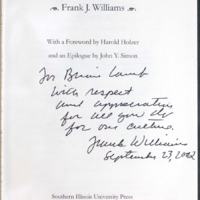-
Title
-
Judging Lincoln
-
Description
-
Collection of nine essays on the topic of Lincoln compiled by Frank J. Williams, chief justice of the Rhode Island Supreme Court and one of the nation’s leading authorities on Abraham Lincoln.
-
Identifier
-
1060441
-
809323915
-
Creator
-
Williams, Frank J
-
Source
-
Brian Lamb Booknotes Collection
-
Gift of Brian Lamb, 2011.
-
Catalog record
-
Language
-
eng
-
Date
-
2002
-
Program air date: November 10, 2002
-
Publisher
-
Southern Illinois University Press
-
George Mason University. Libraries. Special Collections & Archives
-
Subject
-
"Lincoln, Abraham, 1809-1865."
-
"Political leadership--United States--History--19th century."
-
"Character."
-
Relation
-
Original Booknotes interview
-
Rights
-
This work may be protected by copyright laws and is provided for educational and research purposes only. Any infringing use may be subject to disciplinary action and/or civil or criminal liability as provided by law. If you believe that you are the rights-holder and object to Mason’s use of this image, please contact speccoll@gmu.edu.
-
Text
-
Transcription of Annotations
Notes on front endpapers refer to Lincoln's moral vision that set him apart from other politicians of his age, an amendment in the Spring of 1864 that passed the Senate but failed in the House, a letter on slavery - "let Jefferson Davis try me" - that was never sent, an offer in 1862 to compensate border states for loss of property (i.e. slaves), which was rejected. Reference is also made to the Hampton Roads Peace Conference in Feb. 1865, when Lincoln was disingenuous writing a letter stating that no peace commissioners were on the way. Other notes point out that after Lee got away from Gettysburg, Lincoln no longer trusted his generals. George Washington was a role model for Lincoln; he ran for office before becoming a lawyer. Lincoln was an autodidact; he handled more than 5000 cases, 333 before the Illinois Supreme Court. Lincoln is characterized as speaking his mind: on slavery he says: "the most dumb and stupid slave does constantly know that he is wronged". Also mentioned is a critical letter Lincoln sent to Major General Hooker. -- Notes on back endpapers highlight Lincoln's popularity: he won overwhelming support from Union soldiers and won 22 of 25 states. Lincoln lost to McClellan only in Kentucky. It is noted that voting irregularities took place, e.g. in Indiana some soldiers voted 10 or 12 times. Absentee ballots were first introduced in Wisconsin in 1862, but seven states didn't allow them. It is noted that after Emancipation Lincoln kept promoting the colonization of Blacks in Africa. Other notes illustrate that Lincoln sometimes ignored civil liberties, e.g. he proclaimed a blockade, increased the size of the regular army and authorized the expenditure of government money - all without congressional approval. The notes also include a paragraph on Vallandigham, the leading Copperhead, who was Lincoln's biggest critic, was imprisoned following a trial, later banished from the Union, then accepted the Democratic nomination for Governor. Remarks on collecting Lincoln memorabilia and a comparison between Lincoln, FDR and Churchill and the statement that, unlike Lincoln, Churchill was the worst kind of amateur general, complete the notes section. -- The following questions and statements are part of the notes: "Was there a secret fund to buy out Democrats?" - "1862 Bribery Statute: did A.L. violate it?" - "Lincoln always operated within the constraints of the law." - "Is there anything left for collectors that they can afford?" -- Annotations by Brian Lamb in the margins and underlining of pertinent phrases throughout the book.
 1060441.pdf
1060441.pdf